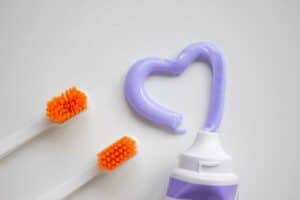
Taking the time to research all the dentists you have to choose from can be well worth your time, especially if you have dental anxiety. Look for a dentist in Livonia who’s known for compassionate care – read reviews, check out websites, and ask around for recommendations. Finding a dentist who understands your fears, is willing to work with you, and understands how to treat anxious patients can make a world of difference in your comfort level.
Once you find a dentist you feel comfortable with, make sure to talk with them about your concerns, fears, and anxieties. Don’t hesitate to share past negative experiences or triggers with them. After all, the more your dentist knows, the better care they can provide in a stress free way. Additionally, always feel free to ask questions about what you should expect.
If you haven’t been to the dentist in a while due to dental anxiety, consider starting with a simple, non-invasive check-up and cleaning. Gradual exposure to dental procedures can help desensitize your anxiety over time. Once you build trust and confidence, you can move on to more complex treatments.
Relaxation techniques such as deep breathing or meditation, or using distractions like listening to music practicing guided imagery can help calm your nerves and reduce anxiety during the dental procedure. You can also consider having a trusted friend or family member accompany you to your dental appointment can provide emotional support and reassurance. They can hold your hand, offer comfort, and further help distract you from your anxiety.
Sedation dentistry is an option for individuals with severe dental anxiety. Various levels of sedation, from mild to deep, can be administered depending on your needs. Discuss this option with your dentist in Livonia to determine if it’s suitable for you.
Dental anxiety is a common but manageable condition. By following these tips and seeking the support of a caring dentist, you can conquer your fears and maintain optimal oral health. Remember, taking small steps and being proactive in your dental care, such as brushing and flossing your teeth every day, will ultimately lead to a healthier, happier smile. Don’t let anxiety stand in the way of your well-being; take charge of your dental health today.
We’re always accepting new patients at our dental offices in Ann Arbor, Canton, Farmington Hills, and Livonia.

Understanding the Basics of Tooth Staining
Before we jump into the discussion of purple toothpaste, we need to understand how and why teeth become stained in the first place. Dental stains can be broadly categorized into two types: extrinsic and intrinsic.
Extrinsic Stains
These are superficial stains that occur on the outer surface of the tooth enamel. Common culprits include coffee, tea, red wine, and smoking. Extrinsic stains are often easier to remove through regular brushing and professional dental cleanings.
Intrinsic Stains
These types of stains are more challenging to treat as they originate within the tooth’s structure. Causes of intrinsic stains include certain medications, fluorosis, and tooth trauma. Intrinsic stains require more specialized treatments like professional teeth whitening or forms of cosmetic dentistry.
The Role of Color Theory in Purple Toothpaste
Now, let’s explore the concept of color theory and how it relates to purple toothpaste. Color theory suggests that certain colors can create optical illusions or perceptions that affect how we perceive the color of objects, including our teeth.
Purple & Yellow
When looking at color theory, we need to consider the color wheel. When examining a color wheel we see that purple is opposite to yellow, meaning purple can counteract yellow. Purple toothpaste, when applied to the teeth, can create an optical illusion by neutralizing yellow or brownish stains. This, in turn, makes the teeth appear whiter. It’s similar to how wearing complementary colors can make your clothing look more vibrant.
The Whitening Ingredients in Purple Toothpaste
However, it’s important to note that many purple toothpaste products on the market do actually contain ingredients that are known for their teeth-whitening properties such as:
While these ingredients do have whitening potential, their effectiveness can vary from product to product.
So, Does Purple Toothpaste Work?
Opinions differ on whether or not purple toothpaste actually whitens teeth or not. Even if you use purple toothpaste and notice some improvement in the color of your teeth, it’s important to know that it’s not a magic solution for teeth whitening. In fact, teeth whitening solutions from your Farmington Hills dentist will typically be fast, more dramatic, and last longer.
More importantly, regardless of the color of your toothpaste, maintaining good oral hygiene practices is essential for achieving and maintaining white teeth, and healthy teeth. Make sure you brush your teeth at least twice a day using fluoride toothpaste, floss daily to remove plaque and debris from between your teeth and along the gumline, and minimize the consumption of stain-causing substances such as coffee, tea, and tobacco products. Additionally, visiting your dentist regularly for professional cleanings and to discuss any concerns about teeth staining or discoloration can help keep your teeth healthy.
Even though purple toothpastes tend to include ingredients that can brighten teeth, it’s important to know that they can also create an illusion of whiter teeth through the principles of color theory, where the purple color neutralizes yellow or brown stains. Their effectiveness can vary greatly based on the product’s ingredients and the type of stains being treated.
If you have significant staining or discoloration issues, consult your dentist for personalized teeth-whitening recommendations.
We’re always accepting new patients at our dental offices in Ann Arbor, Canton, Farmington Hills, and Livonia.

How Can Oral Health Affect Overall Health?
There’s a concept called the oral-systemic connection that has gained significant attention in the medical field in recent years. It refers to the intricate and interesting relationship between oral health and the overall health of the body. It’s no longer a secret that poor oral health can contribute to various whole-health issues, including heart disease, diabetes, and respiratory problems. Now, emerging research is shedding light on the connection between oral health and breast cancer.
The Link Between Gum Disease and Breast Cancer
One of the most compelling pieces of evidence linking oral health to breast cancer risk is the association between gum disease (periodontal disease) and breast cancer. Multiple studies have indicated that women with gum disease have a higher risk of developing breast cancer than those with healthy gums.
Researchers believe that the inflammation caused by gum disease may be a significant contributing factor. Chronic inflammation is known to play a crucial role in the development and progression of various cancers, including breast cancer. When the gums are infected and inflamed, the body’s immune response is activated, releasing inflammatory molecules into the bloodstream. These molecules can potentially reach breast tissue and promote the growth of cancer cells.
The Role of Oral Bacteria
Another intriguing aspect of the oral-breast cancer connection involves the role of specific oral bacteria. Some studies have identified certain types of bacteria that are more prevalent in the mouths of women with breast cancer. These bacteria produce enzymes that can modify estrogen, a hormone associated with breast cancer development.
Maintaining Good Dental Habits
Maintaining good dental habits is wise for various reasons, but knowing that it may help reduce the risk of breast cancer makes it crucial. Make sure you’re:
Brushing your teeth twice a day and flossing daily can help keep your gums healthy and reduce the risk of gum disease and therefore the risk of cancers, including breast cancer.
Sugary foods and drinks can contribute to tooth decay and gum disease. Reducing sugar consumption can improve your oral health and overall health.
Smoking is a significant risk factor for gum disease and various cancers, including breast cancer. Quitting smoking is a crucial step in improving both your oral and overall health.
A diet rich in fruits, vegetables, and whole grains provides essential nutrients for gum health. Additionally, antioxidants found in these foods may help reduce inflammation in the body.
Visiting your dentist in Canton for regular checkups and cleanings is essential. Dentists can detect gum disease early and provide treatment to prevent its progression. Make sure to schedule an appointment every six months.
While more research is needed to fully understand the complex relationship between oral health and breast cancer, the evidence so far suggests that good dental habits can play a role in reducing the risk of this prevalent cancer. Taking care of your oral health by practicing good dental hygiene, visiting your dentist regularly, and making healthy lifestyle choices can contribute to a healthier overall well-being.
We’re always accepting new patients at our dental offices in Ann Arbor, Canton, Farmington Hills, and Livonia.

Not all Halloween candies are created equal when it comes to dental health. Some are more damaging than others. Hard candies, lollipops, and jawbreakers can pose a significant risk to your teeth as they stay in your mouth for an extended period, exposing your teeth to sugar and acids. Instead, opt for chocolates or treats that can be consumed quickly, minimizing the time your teeth are exposed to sugar.
If you have a choice, opt for dark chocolate over milk chocolate or sticky candies. Dark chocolate contains less sugar and is less likely to stick to your teeth. Plus, it has antioxidants that can benefit your overall health.
Sticky and gummy candies like taffy, caramel, and gummy bears can cling to your teeth, providing a feast for harmful bacteria. These candies are notorious for causing cavities. If you do indulge, be sure to brush and floss thoroughly afterward to reduce the risk of needing to get a filling from your dentist in Ann Arbor.
It’s tempting to dive headfirst into a mountain of Halloween candy, but exercising restraint is crucial for your dental health. Limit the number of treats you consume in one sitting and throughout the day. This helps reduce the amount of sugar your teeth are exposed to and gives your saliva time to neutralize acids and repair damage.
Water is your mouth’s best friend, especially during the Halloween season. Drinking water helps rinse away sugar and acids from your teeth, reducing the risk of cavities. Carry a reusable water bottle with you while trick-or-treating or at Halloween parties to stay hydrated and protect your teeth.
After indulging in Halloween treats, consider chewing sugar-free gum, preferably one containing xylitol. Chewing gum stimulates saliva production, which helps neutralize acids and clean your mouth. Xylitol can also inhibit the growth of harmful bacteria.
Halloween or not, maintaining a solid oral hygiene routine is essential for healthy teeth. Make sure you brush your teeth for at least two minutes, twice a day, using fluoride toothpaste. Don’t forget to floss to remove food particles between your teeth and along the gumline. Proper oral hygiene helps minimize the damage caused by sugar and prevents cavities.
Regular dental check-ups with your dentist in Ann Arbor are essential for maintaining good oral health. Schedule a dental appointment after Halloween to assess any potential damage and address any concerns. Your dentist can provide personalized advice on maintaining healthy teeth.
Enjoying Halloween treats without damaging your teeth is possible with some smart choices and good dental habits. Remember to choose your candies wisely, consume them in moderation, and prioritize oral hygiene. With these tips, you can have a happy and healthy Halloween season without any frightening dental surprises.
We’re always accepting new patients at our dental offices in Ann Arbor, Canton, Farmington Hills, and Livonia.

Why You Need a Dental First Aid Kit
Dental emergencies can strike at any time and often catch us off guard. From a sudden toothache to a chipped tooth, the pain and discomfort can be overwhelming. Having a dental first aid kit ready can prepare you for the unexpected, and the items inside can help in various ways.
Essential Items for Your Dental First Aid Kit
Now that you understand the importance of a dental first aid kit, let’s delve into what items you should include so you’re ready for anything.
Remember, a dental first aid kit is not a replacement for professional dental care. It’s a temporary solution to manage oral emergencies until you can see a dentist. Regular dental check-ups and good oral hygiene practices remain the best ways to prevent dental emergencies in the first place.
We’re always welcoming new patients at our dental offices in Ann Arbor, Canton, Farmington Hills, and Livonia. Call the office closest to you to schedule an appointment today.

Causes of Gum Recession
There’s no one thing that causes gum recession, and it’s important for your dentist to determine the underlying cause before recommending a treatment plan. Gum recession can be caused by various factors, including:
Treatment for Gum Recession
Treatment options for gum recession vary based on the severity of the recession and its underlying causes. Some treatments include:
Desensitizing Agents
Over-the-counter or prescription toothpaste and mouthwash can help alleviate sensitivity caused by exposed tooth roots.
Fluoride Treatments
Professional fluoride applications can strengthen the enamel and reduce sensitivity.
Scaling and Root Planing
A deep cleaning procedure that removes plaque and tartar from below the gumline, allowing the gums to reattach to the teeth.
Antibiotics
In cases of gum disease, antibiotics may be prescribed to control bacterial infection and inflammation.
Lifestyle Modifications
Making healthier lifestyle choices, such as maintaining a balanced diet, staying hydrated, and managing stress, can contribute to gum health.
In cases where gum recession has progressed significantly, surgical interventions may be necessary.
Gum Grafting
This procedure involves taking tissue from another part of the mouth, such as the palate, and attaching it to the area with receding gums. This helps cover the exposed tooth roots and prevent further recession.
Pinhole Surgical Technique
A minimally invasive procedure where a small hole is made in the gum tissue and special instruments are used to reposition the gum over the exposed roots.
Regenerative Procedures
These techniques involve stimulating the growth of new gum tissue and bone to restore areas that have been affected by gum disease.
Preventing Gum Recession
Preventing gum recession involves a combination of good oral hygiene practices and healthy lifestyle choices:
Gum recession is a common dental issue that can have significant consequences for oral health and aesthetics. By understanding its causes, practicing preventive measures, and seeking timely treatment, individuals can maintain healthy gums and preserve their smiles for years to come. Remember, regular dental check-ups with your Farmington Hills dentist are crucial for addressing and managing gum recession effectively.
We’re always accepting new patients at our dental offices in Ann Arbor, Canton, Farmington Hills, and Livonia.

The Habitual Cheek Bite
Biting your cheeks might seem innocuous, but when done regularly, it can have repercussions beyond just temporary discomfort. Habitual cheek biting involves repeatedly clenching your teeth down on the soft tissue of your inner cheeks. Over time, this can cause irritation, inflammation, and even result in sores or ulcers in the mouth. While these symptoms might be uncomfortable on their own, they can also indirectly affect your teeth.
Dental Damage: Consistent cheek biting can create pressure on your teeth. This constant pressure can result in micro-fractures, chips, or cracks in your teeth. Over time, this damage might necessitate dental treatments such as dental bonding, fillings, or even crowns to restore the affected teeth.
Shift in Tooth Alignment: Habitual cheek biting can also affect the alignment of your teeth. The repetitive movement of your teeth against the cheek can push them out of their natural positions, potentially leading to malocclusion or misalignment. This might require treatment from your Ann Arbor dentist to correct the issue.
Bruxism Aggravation: Cheek biting is often associated with bruxism – the habit of clenching or grinding your teeth, usually during sleep. Bruxism can lead to enamel erosion, tooth sensitivity, and jaw pain. Habitual cheek biting can exacerbate these issues, intensifying the impact of bruxism on your dental health.
Prevention and Management
There are several ways you can prevent dental damage caused by habitual cheek biting including:
Awareness and Mindfulness: The first step in addressing cheek biting is to become more aware of when you’re doing it. Pay attention to moments when you catch yourself biting your cheeks, and try to identify any triggers. Practicing mindfulness and stress reduction techniques can also help minimize the instances of cheek biting.
Mouthguards: For those who find it challenging to control cheek biting, your dentist in Ann Arbor can create custom mouthguards or splints to help. These devices act as a barrier between your teeth and cheeks, preventing direct contact and reducing the potential damage caused by clenching and grinding.
Biting your cheeks might seem like a minor concern, but its impact on your dental health can be significant. From dental damage and misalignment to exacerbating bruxism-related problems, this seemingly harmless habit can lead to various oral health issues. The key lies in awareness, stress management, and seeking professional guidance when needed. By taking steps to address and mitigate cheek biting, you can preserve your dental health and maintain a confident smile for years to come.
Remember, a proactive approach to oral health can lead to a happier and healthier mouth.We’re always accepting new patients at our dental offices in Ann Arbor, Canton, Farmington Hills, and Livonia.

The Oral-Brain Connection
The mouth serves as the gateway to the body, and its health can impact various aspects of overall health, so it’s not surprising that the oral-brain connection has caught the attention of scientists. Poor oral hygiene can lead to the accumulation of harmful bacteria in the mouth, causing gum disease and other oral infections. Interestingly, these oral pathogens don’t just stay confined to the mouth – they can find their way into the bloodstream and potentially reach the brain.
Inflammation and Alzheimer’s
One of the key factors linking oral health and Alzheimer’s disease is inflammation. Chronic inflammation is believed to contribute to the development and progression of various diseases, including Alzheimer’s. Gum disease triggers an inflammatory response in the body, and if left untreated, this inflammation can spread to other parts of the body, including the brain.
Research has shown that the presence of specific oral bacteria associated with gum disease can be detected in the brains of individuals with Alzheimer’s disease. These bacteria might contribute to the formation of beta-amyloid plaques, a hallmark of Alzheimer’s, by activating the immune system and promoting inflammation in the brain. Therefore, maintaining good oral health could potentially help reduce the risk of chronic inflammation and its potential impact on brain health.
The Blood-Brain Barrier
The blood-brain barrier is a protective network of blood vessels that acts as a barrier between the bloodstream and the brain. It prevents harmful substances from entering the brain while allowing essential nutrients to pass through. However, certain infections and inflammatory responses can compromise the integrity of this barrier, potentially allowing harmful agents to reach the brain.
Oral bacteria associated with gum disease can release toxins that may weaken the blood-brain barrier. This weakening can make it easier for harmful substances to enter the brain, triggering an immune response that contributes to inflammation and damage. By maintaining good oral health, you might be able to reduce the risk of these oral bacteria infiltrating the brain and compromising the blood-brain barrier’s function.
Preventive Strategies
While research into the link between oral health and Alzheimer’s is still ongoing, there are several steps you can take to prioritize your oral hygiene and potentially support your cognitive health:
Brush & Floss Regularly: The foundation of good oral hygiene lies in regular brushing and flossing. Brush your teeth at least twice a day with fluoride toothpaste and don’t forget to floss to remove food particles and plaque from between your teeth.
Visit Your Dentist in Canton: Regular dental check-ups are essential for detecting and addressing any oral health issues early on. Your dentist can help you maintain healthy gums and catch any signs of gum disease.
Eat A Balanced Diet: A diet rich in fruits, vegetables, lean proteins, and whole grains can contribute to both oral and overall health. Avoid sugary snacks and beverages that can promote tooth decay.
Stay Hydrated: Drinking water helps wash away food particles and bacteria that can lead to plaque formation.
Avoid Smoking & Excessive Alcohol: Smoking and heavy alcohol consumption are linked to increased risk of gum disease and can have negative effects on oral health.
The connection between oral health and cognitive health is an exciting area of research that holds promise for our understanding of neurodegenerative diseases like Alzheimer’s. While more studies are needed to establish a definitive link between good oral hygiene and reduced Alzheimer’s risk, the existing evidence suggests that prioritizing oral health might have more far-reaching benefits than we previously imagined. By taking care of your teeth and gums, you could potentially be taking a proactive step towards protecting your brain health in the long run. So, don’t underestimate the power of a healthy smile or the importance of visits to your dentist in Canton – they could be a window to a healthier brain.
We’re always accepting new patients at our dental offices in Ann Arbor, Canton, Farmington Hills, and Livonia.

The Surprising Link Between Dental Health and Headaches
Headaches happen to basically everyone and are a widespread issue, affecting millions of people around the world. They can range from mild discomfort to debilitating pain, significantly impacting one’s quality of life. While many things can trigger a headache, an often overlooked cause of chronic headaches or even migraines is dental problems.
Teeth Grinding
One of the most common dental-related causes of headaches is bruxism, which refers to the habit of grinding or clenching the teeth unconsciously. Bruxism often occurs during sleep or times of stress, and the constant pressure on the jaw and surrounding muscles can lead to tension headaches.
Malocclusion
Malocclusion, also known as misaligned teeth or a bad bite, can be a hidden culprit behind chronic headaches. When your teeth do not fit together correctly, it can strain the jaw muscles and lead to muscle tension, triggering headaches.
TMJ Disorder
Within the realm of dental health and headaches, one crucial aspect is Temporomandibular Joint (TMJ) disorders. These conditions can cause jaw pain, facial discomfort, and, most notably, headaches.
How Your Dentist Can Provide Headache Relief
Now that we’ve explored the dental factors that contribute to headaches, let’s delve into how your dentist can help provide relief and improve your overall well-being.
If you’re dealing with bruxism, your dentist in Farmington Hills can create a customized mouthguard or splint to wear while you sleep. This device acts as a protective barrier, preventing your teeth from grinding against each other and alleviating the strain on your jaw muscles. As a result, you may notice a significant reduction in headaches over time.
For individuals with a bad bite, orthodontic treatments can be life-changing. Braces, clear aligners, or other orthodontic appliances can gradually realign your teeth, improving your bite and reducing the tension that contributes to headaches.
In some cases, headaches may be linked to issues with the temporomandibular joint (TMJ), the hinge that connects your jaw to your skull. Your dentist can provide TMJ therapy, which may include exercises, medication, or other treatments, to alleviate discomfort and reduce headache frequency.
While most individuals seek headache or migraine relief from over-the-counter painkillers or home remedies, they may not realize that their headaches could be linked to their dental health and should see a dentist in Farmington Hills. So the next time you find yourself reaching for that painkiller to combat yet another headache, consider a different approach – visit your dentist!
We’re always accepting new patients at all of our dental offices in Ann Arbor, Canton, Farmington Hills, and Livonia.

What Is Dry Mouth?
Dry mouth, which is also medically known as xerostomia, is a condition that occurs when there isn’t enough saliva production in the mouth. It can happen to anyone, and while occasional dry mouth may be normal, chronic dryness can lead to a range of uncomfortable symptoms, and affect speech, eating, and even dental health.
What Causes Dry Mouth?
Numerous factors can trigger dry mouth, and understanding the root cause is crucial in determining the best, most effective treatments. Your dentist in Livonia will evaluate you for some of the most common causes of dry mouth including:
Medications
Certain medications, such as antihistamines, antidepressants, and diuretics, are notorious for causing dry mouth as a side effect.
Medical Conditions
Dry mouth can be a symptom of underlying medical conditions like Sjögren’s syndrome, diabetes, and autoimmune disorders. By understanding the connection between these conditions and dry mouth, we can explore potential cures tailored to each situation.
Lifestyle
External factors like smoking, alcohol consumption, and breathing through the mouth can exacerbate dry mouth symptoms.
The Consequences of Untreated Dry Mouth
The impact of untreated dry mouth goes beyond mere discomfort. For example, dry mouth can have potential consequences on oral health, nutrition, and overall well-being. Understanding these implications underscores the importance of finding viable solutions.
Available Treatments for Dry Mouth
While there might not be a one-size-fits-all cure for dry mouth, various treatments can help alleviate symptoms and improve the quality of life for those affected. Talk to your dentist in Livonia to determine the best treatment for your dry mouth.
Over-the-Counter Remedies
There’s an array of over-the-counter products specifically designed to combat dry mouth, including mouthwashes, sprays, and lozenges.
Lifestyle Changes
Embracing and making specific lifestyle changes like quitting smoking or limiting alcohol intake can also play a significant role in managing dry mouth.
Prescription Medications
For severe cases of dry mouth, prescription medications may offer more substantial relief.
Dry mouth may be an annoying challenge, but there are things you can try to help cure it. By determining the root cause, exploring available treatments, and making lifestyle changes, relief is within reach. If you or someone you know suffers from dry mouth, start by scheduling an appointment with your dentist in Livonia.
We have four dental offices in Ann Arbor, Canton, Farmington Hills, and Livonia. Call either our Panther Creek or Medical Plaza Drive office today.